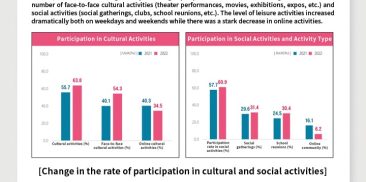特別号
-
2023 October (Vol.91)
-
特別号 登録日投稿者SMG ヒット759

Going Together with the Socially Neglected Index
The Seoul Metropolitan Government (SMG) announced that it has newly developed the Going Together with the Socially Neglected (GTSN) Index, a pivotal tool in assessing the city’s commitment to this core philosophy of the 8th municipal administration. The GTSN Index, to be calculated on an annual basis, will serve as a vital tool to gauge the city’s progress in realizing its commitment to inclusivity. By utilizing this index, Seoul aims to identify and enhance areas requiring attention, ensuring that the policies most essential to its citizens are effectively integrated into their daily lives. Each index will be meticulously calculated with 2022 as the baseline, representing a value of 100, which coincides with the inception of the “GTSN” vision. For instance, if the calculated index falls below the baseline value of 100, a thorough analysis will ensue to pinpoint the underlying causes. In the event that the dip in the index is attributed to heightened demand, the budget allocation will be expanded to accommodate increased support targets. Conversely, if project feasibility issues are identified, efforts will be made to enhance policy efficiency through targeted improvement measures. While various indicators have previously compared municipal/national conditions as well as societal phenomena, such as the EU Social Exclusion Index and the OECD Better Life Index, the GTSN Index stands as the pioneering global initiative to assess the efficacy of a city’s policies and actively leverage these findings for policy enhancement and budgetary planning. The GTSN Index has been meticulously crafted with the aim of proactively identifying social risks and enhancing the quality of citizens’ lives. This innovative tool conducts in-depth evaluations and analyses in crucial areas directly impacting residents’ daily lives, including livelihood, housing, healthcare, and education, all of which can be influenced by varying degrees of social risk. Moreover, this initiative underscores Seoul’s unwavering commitment to its residents, assuring them that the city will remain steadfast in its dedication to the promotion of policies aimed at inclusivity and supporting those who are socially marginalized. Furthermore, the GTSN Index’s overarching objective is to eliminate any oversight and enhance the efficacy of policies by prioritizing the needs of vulnerable populations. This strategic approach becomes increasingly crucial in light of the growing trends of social polarization and inequality, as emphasized by city officials. The GTSN Index encompasses 50 detailed indicators across six areas: livelihood and child care; housing; medical and health; education and culture; public safety; and social integration. The detailed indicator and index research results will be calculated annually, and reported in the first half of the subsequent year. The result of the GTSN Index will play a pivotal role in shaping the comprehensive municipal administration. These results will be harnessed as a proactive tool to systematically structure and manage projects with a focus on marginalized communities, ensuring an effective allocation of resources and budgets. Structure of the Going Together with the Socially Neglected (GTSN) Index GTSN Index 1 comprehensive index ‣ A comprehensive index that embodies the principles of “Going Together with the Socially Neglected” and aligns with the municipal policy direction. Area-specific index 6 specific areas ‣ A comprehensive area-specific performance index Detailed indicators 50 indicators ‣ Setting 2022 as the baseline year, calculates the current year’s results compared to the baseline year (2022 = 100).Going Together with the Socially Neglected Index Comprehensive Index Going Together with the Socially Neglected Index 6 Areas Livelihood & Child Care Housing Medical & Health Education & Culture Public Safety Social Integration 10 Tasks Restoring Seoul’s social mobility ladder by supporting revitalization of the marginalized
Building resiliency by enlarging safety nets for those who need child care supportRestoring Seoul’s housing ladder for housing-marginalized and future generations Reducing health disparities for the marginalized
Fostering mental health recovery for those who need mental health care supportExpanding the learning opportunity for the marginalized in education
Expanding the access to the culture and leisure activities by extending the cultural supportBuilding a tight social safety net by providing safety support to vulnerable groups and taking proactive action
Improving mobility for the transportation vulnerableStrengthening social bonding by going together with citizens 50 Indicators Assistance rate for families in crisis Number of public rental housing units Size of at-home health care provided to health vulnerable groups Learning competency of the marginalized children Child abuse detection rate Sense of social inclusion of multicultural citizens 
Like It
61 人がいいね!と言っています。








